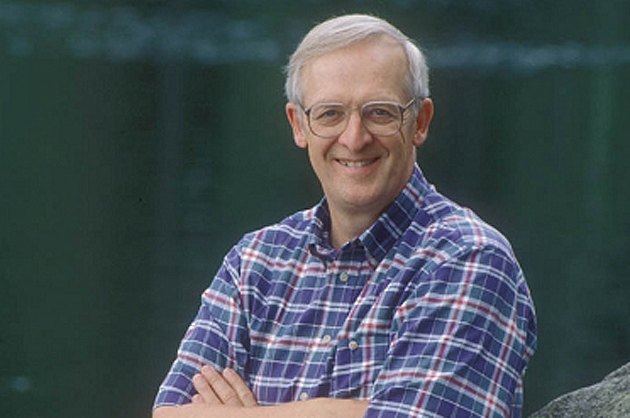
Gene E. Likens, an eminent and internationally-known scholar in the field of ecology, has agreed to serve as the University of Connecticut’s environmental advisor. In this capacity, Likens will work with students, faculty, and staff on a wide range of sustainability projects and initiatives, and advise the University on matters of environmental policy. He will also advise the president and provost on environmental matters, and work to identify opportunities for the University to utilize its educational and research capacity to play a role in relevant environmental issues.
Likens has been a Board of Trustees Distinguished Professor (visiting) since 2005, and will now serve in that role, and more, each fall semester over the next three years.
He was awarded the 2001 Medal of Science, the nation’s highest scientific honor, for his work in the field of ecology and was a co-recipient of the 2003 Blue Planet Prize – an environmental award on par with the Nobel Prize – for outstanding scientific research that helps to solve global environmental problems.
“Gene is unquestionably one of the most important and influential environmental researchers in the U.S. and the world,” says UConn President Susan Herbst. “This is quite a coup for UConn. We have been very lucky to have him here from time to time for the last few years, and we’re thrilled that he has agreed to step into this new role. We as an institution will benefit tremendously from his teaching, expertise, and leadership in the years to come.”

Likens founded what is now called the Cary Institute of Ecosystem Studies in New York in 1983 and was the co-founder of the Hubbard Brook Ecosystem Study in 1963, which has shed light on critical links between ecosystem function and land-use practices. According to the Cary Institute’s website, Likens and his colleagues were the first scientists to discover acid rain in North America and to document the link between the combustion of fossil fuels and an increase in the acidity of precipitation. His findings have influenced politicians and policy makers, guided and motivated scientific studies, and increased public awareness of human-accelerated environmental change.
“We are particularly delighted to have Gene Likens, and his wife Phyllis, associated with the University of Connecticut,” says Gregory Anderson, a Distinguished Professor of Ecology and Evolutionary Biology Emeritus at UConn. “Gene has been a Board of Trustees Distinguished Research Professor for the past few years, teaching full seminar courses in ethics and on topics in various environmental areas; our students and faculty have benefitted enormously from his focus and experience. He is a world-recognized leader in ecology, an incredibly accomplished and recognized scholar, and a thoughtful, dedicated, and humble person. He has contributed a great deal to the intellectual climate at UConn especially in biology, and, in this new role will not only continue to do that, but also broaden his influence in work with the President’s Office to promote various University programs.”
Likens’ current research focuses on the ecology and biogeochemistry of forest and aquatic ecosystems, primarily through long-term studies at the Hubbard Brook Experimental Forest in New Hampshire’s White Mountains.
“The University of Connecticut is an amazingly vibrant and productive institution,” said Likens. “I have greatly enjoyed the opportunity to contribute to this intellectual environment during the past several years, and look forward to a continuing role as educator and environmental advisor.”
In 2006, Likens was elected to be a member of the American Philosophical Society. He was previously elected to the National Academy of Sciences in 1981, and the American Academy of Arts and Sciences in 1979.
He has served as a faculty member at universities throughout the U.S. and the world, and is the author, co-author, or editor of 23 books and more than 550 scientific papers.



